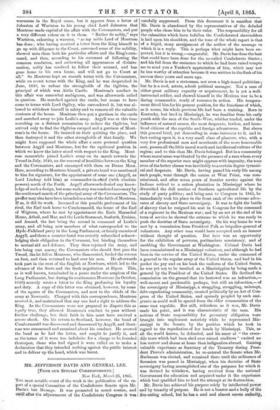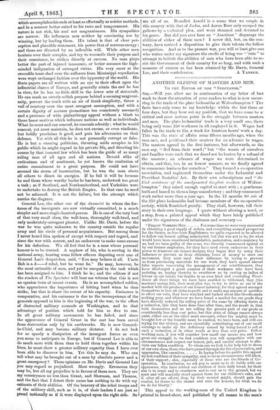New York, March 25, 1865. THE most notable event of
the week is the publication of the re- port of a special Committee of the Confederate Senate upon Mr. Davis's last Message. It was presented in secret session, and until aftet the adjournment of the Confederate Congress it was
carefully suppressed. From this document it is manifest that Mr. Davis is abandoned by the representatives of the deluded people who chose him to be their ruler. The responsibility for all
the calamities which have befallen the Confederated slaveholders is laid upon his shoulders, and the tone of the whole report is that of a frigid, stony arraignment of the author of the message to which it is a reply. This is perhaps what might have been ex- pected, but it is wrong,—ungrateful. Mr. Davis has done the best that could have been done for the so-called Confederate States ; and his fall from the eminence to which he had been raised tempts me to send you a Yankee's appreciation of him, which may not be less worthy of attention because it was written in the flush of his success three years and more ago.
Mr. Davis is not a statesman, not even a high-toned politician ; but he is a cool, astute, adroit political manager. Not a man of either great military capacity or acquirement, he is yet a well- instructed soldier, and showed himself in the Mexican war to be a daring commander, ready of resource in action. His tempera- ment fitted him for his present position, for the functions of which, as it seems, his whole previous life had been a training. Born in Kentucky, but bred in Mississippi, he was familiar from his early youth with the men of the South-West, whither tended, under the influence of natural causes, the most desperate, lawless, and looie- lived citizens of the republic and foreign adventurers. But above this general level, yet descending in some instances to it, and in fact resting upon it, is a very small class of planters, who, with a very few professional men and merchants of the more honourable sort, poz.sess all the little moral worth and intellectual culture of the region; and to this class Mr. Davis belonged. But iu a community whose moral sense was blunted by the presence of a race whom every member of the superior race might oppress with impunity, the tone even of the better classes was inevitably to a certain degree tyranni- cal and desperate. Mr. Davis, having passed his early life among such people, went through the course at West Point, was com- missioned, and after seven years of frontier service against the Indians retired to a cotton plantation in Mississippi where he diversified the dull routine of Southern agricultural life by the study of party politics ; and being sent to Congress in 1845, he immediately took his place in the front rank of the extreme advo- cates of slavery and State sovereignty. It was to fight the battle of slavery that he resigned his seat in Congress for the command of a regiment in the Mexican war; and by an act at the end of his term of service he showed the extreme to which he was ready to push the doctrine of State sovereignty. On his way home he was met by a commission from President Polk as brigadier-general of volunteers. Any other man would have accepted such an honour without thought of question. But here was an opportunity for the exhibition of perverse, pertinacious consistency, and of snubbing the Government at Washington. Colonel Davis had been commissioned as a Mississippi volunteer, and although he had been in the service of the United States, under the command of a general in the regular army of the United States, and had in his pocket the pay and on his back the uniform of the United States, he was yet not to be insulted as a Mississippian by being made a general by the President of the United States. He declined the commission on the ground that its bestowal was an infraction,— well-meant and pardonable perhaps, but still an infraction,—of the sovereignty of Mississippi, a straggling, struggling, unkempt, debt-repudiating community, created politically by an Act of Con- gress of the United States, and sparsely peopled by such emi- grants as could well be spared from the older communities of the same vast republic. But still, ridiculous as it was, Mr. Davis made his point, and it was characteristic of the man. His notions of State responsibility for pecuniary obligation were brought into unpleasant notoriety while he represented Mis- sissippi in the Senate, by the position which he took in regard to the repudiation of her bonds by 1\lissisdppi. This, as all the world knows, he defended, and his sneer at " the croco- dile tears which had been shed over ruined creditors " excited no leis sorrow and shame at home than indignation abroad. Gaining valuable experience as Secretary of the Treasury during Presi- dent Pierce's administration, he re-entered the senate when Mr. Buchanan was elected, and remained there until the ordinance of Secession was passed in Mississippi, when his doctrine of State sovereignty having accomplished one of the purposes for which it was devised he withdrew, having received from the national Government the education and acquired under it the experience which best qualified him to lead the attempt at its destruction.
Mr. Davis has achieved his purpose solely by intellectual power and by tenacity of purpose. He is not a boaster and a bully of the fire-eating school, but he has a cool and almost serene audacity, which accomplishes his ends at least as effectually as noisier methods, and iu a manner better suited to his taste and temperament. His nature is not rich, his soul not magnanimous. His sympathies are narrow. He influences men neither by convincing nor by winning, but by leading them. His talent is that of clear per- ception and plausible statement, his power that of nervous energy ; and these are directed by an inflexible will. While other men hesitate over their scruples, and try to reconcile their purpose and their conscience, he strikes directly at success. No man plays better the part of injured innocence, or better assumes the high- minded indignation of outraged virtue. His very sneer at the crocodile tears shed over the sufferers from Mississippi repudiation were wept archangel fashion over the hypocrisy of the world. His State papers are all written with an eye to their effect upon the influential classes of Europe, and generally attain the end he has in view, for he has no little skill in the lower arts of statecraft. He can mask an utterly selfish purpose behind a seeming magnani- mity, pervert the truth with an air of frank simplicity, throw a veil of courtesy over the most arrogant assumption, and with a certain dignity of manner (sometimes too consciously assumed) and a pretence of wide philanthropy appeal without a blush to those baser motives which influence nations as well as individuals. What he must and can conceal, he conceals adroitly what he would conceal, yet must maintain, he does not excuse, or even vindicate, but boldly proclaims it good, and puts his adversaries on their defence. Yet with all this he is not personally corrupt or false. He is but a cunning politician, thrusting aside scruples in his public which he might regard in his private life, and directing his course by that immoral law which has been the guide of so many ruling men of all ages and all nations. Devoid alike of enthusiasm and of sentiment, he yet knows the exaltation of entire commitment to a great purpose. He could not have aroused the storm of insurrection, but he was the man above all others to direct its energies. If he fail it will be because he and those whose worthy leader he has been, undertook too great a task ; as if Scotland, and Northumberland, and Yorkshire were to undertake to destroy the British Empire. In that case he need not be ashamed. It is not the failure, but the attempt which carries the disgrace.
General Lee, the other one of the duumviri to whom the for- tunes of the insurgents are now virtually committed, is a much simpler and more single-hearted person. He is one of the very best of that very small class, the well-born, thoroughly well-bred, and only moderately-arrogant planter. Unlike Mr. Davis, before the war he was quite unknown to the country outside the regular army and his circle of personal acquaintance. But among those I never heard him spoken of except with respect and regard, and since the war with sorrow, and an endeavour to make some excuse for his defection. We all feel that he is a man whose personal honour is to be trusted. A nephew of his, who is serving in the national army, hearing some fellow officers disputing over one of General Lee's despatches, said, " You may believe it all. Uncle Bob is a d—d rebel, but he wont lie." He may, however, be the most estimable of men, and yet be unequal to the task which has been assigned to him. I think he is ; and the editors if not the readers of The Spectator will bear me witness that this is not an opinion born of recent events. He is an accomplished soldier, who appreciates the importance of hitting hard when he does strike, but that is about the extent of his capacity. Eminence is comparative, and his eminence is due to the incompetence of the generals opposed to him in the beginning of the war, to the effect of distracted military counsels at Washington, and to that advantage of position which told for him as five to one. In all great military movements he has failed, and since the appearance of General Grant in the east has been saved from destruction only by his earthworks. He is now General- in-Chief, and may become military dictator. I do not look for so speedy a dissipation of the insurgent forces as even you seem to anticipate in Europe, but if General Lee is able to do much more with them than to hold them together within his lines, he must show a greater military capacity than I have ever been able to discover in him. Yet this he may do. Who can tell what may be brought out of a man by absolute power and a great emergency? These opinions on Mr. Davis and General Lee
you may regard as prejudiced. Most wrongly. Erroneous they may be, but all my prejudice is in favour of these men. They are my countrymen no less than Grant, and Sherman, and Thomas,
and the fact that I detest their cause has nothing to do with my estimate of their abilities. Of the bravery of the rebel troops and
of the military skill, such as it is, of their leaders I am just as proud nationally as if it were displayed upon the right side. So
are all of us. Benedict Arnold is a name that we couple in this country with that of Judas, and Aaron Burr only escaped the gallows by a technical plea, and went shunned and detested to his grave. But did you ever hear an " American " disparage the abilities of either of those men ? I never did, but, on the con- trary, have noticed a disposition to give their talents the fullest recognition. And as to the present war, you will at least give one who writes under my signature the credit of being too " 'cute " to attempt to belittle the abilities of men who have been able to re- sist the Government of their country for so long, and with such a measure of success as has been attained by Mr. Davis, General































 Previous page
Previous page